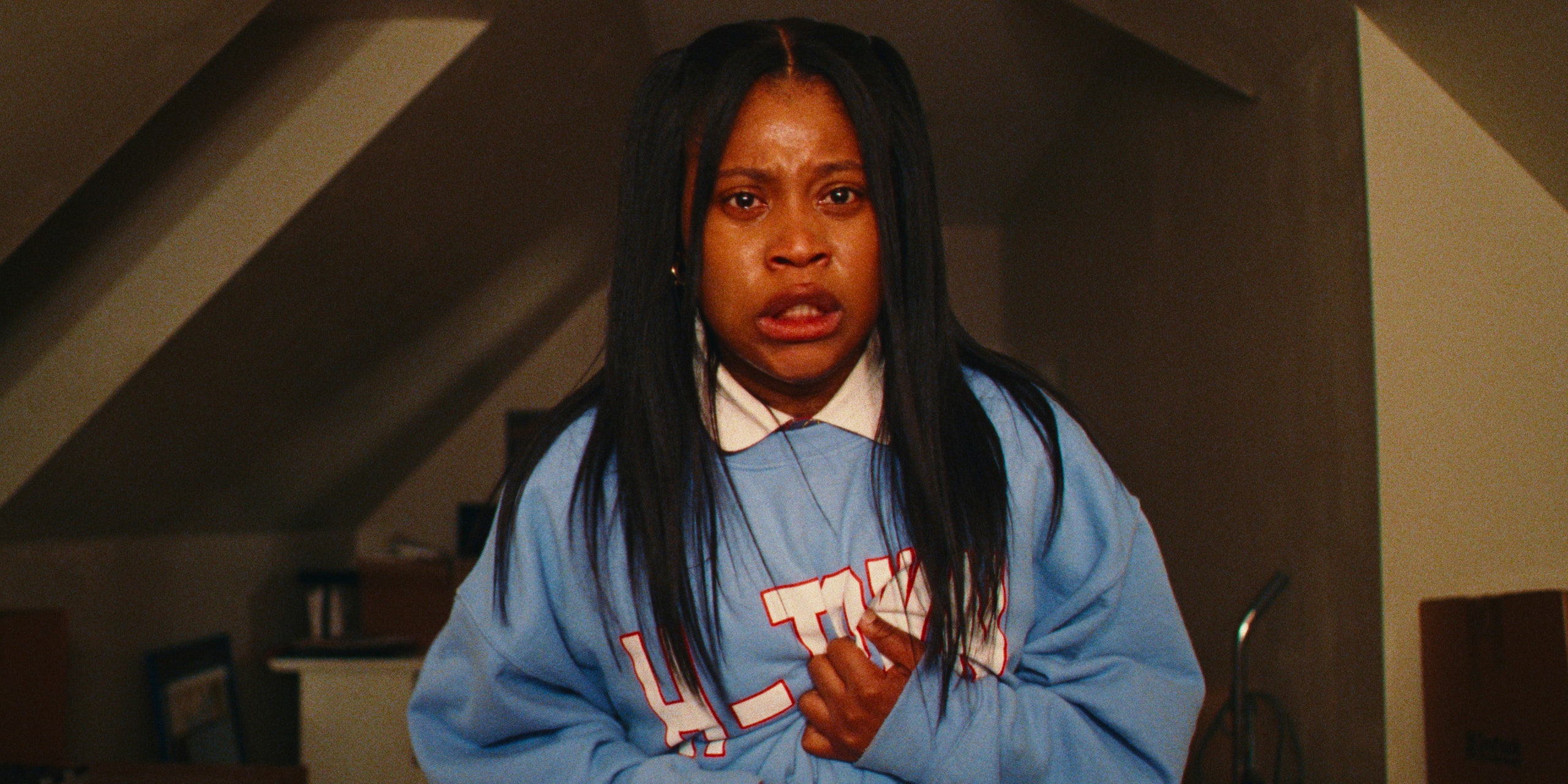Spoiler alert: The following review contains plot details from the first season of Swarm.
Have you ever crossed the thin red line between diehard and obsessive fandom? Don’t be ashamed. Whether the object of your monomania was an athlete, actor, or pop star, it’s incredibly human to latch onto stars and defend them like your livelihood depends on it. But in recent years, especially on social media, that passion has significantly intensified. Possible reasons include increased tech-and pandemic-bred isolation, the supposed familiarity between fan and celebrity that’s incubated on platforms like TikTok and Instagram, and the speed at which immense fan bases can now mobilize. In the limited series Swarm, these ideas provide a jumping off point into a character study that starts out as a satirical, blood-splattered look at unhinged fandom before turning into so much more.
Dominique Fishback stars as Dre, a broke and lonely Houston woman in her 20s who fills her existential voids with a tight bond with her roommate Marissa (Chloe Bailey) and an unhealthy fixation with the world’s biggest pop star, Ni’Jah—a purposely obvious stand-in for Beyoncé. In the pilot—directed by Donald Glover, and written by Glover and Swarm co-creator Janine Nabers—there is a rift between Dre and Marissa, as Marissa considers settling into adulthood alongside her bozo-ass boyfriend Khalid (Damson Idris). Meanwhile, Dre is delusional: blowing $1,800 on Ni’Jah tickets when she can’t pay rent and spending her free time as part of a BeyHive-like online fan community called the Swarm.
The episode takes a twisted turn when Marissa kills herself on the night of a surprise Ni’Jah album drop, after a breakup with Khalid. This loss sends Dre into a spiral. At the end of the episode, she shows up at Khalid’s house and kills him by repeatedly bashing him over the head with a lamp. It’s the beginning of Dre’s murderous journey throughout the season, as she takes on different identities and targets people who have talked shit about Ni’Jah online. Think the Coen Brothers meets Atlanta meets Carrie, with some Basic Instinct and Perfect Blue thrown in there too.
The first three episodes of Swarm are exciting and subversive television. The violence is bloody, brutal, and darkly funny. Dre takes on the tics of a classic slasher villain, complete with a Michael Myers head tilt and a hilariously deadpan pre-kill catchphrase: “Who is your favorite artist?” In one of the best moments of the entire season, she sneaks into the home of a man who was mouthing off on Twitter and, after immobilizing him with a sledgehammer, poses her question. When he tells her “Lil Gibble” (great fake rap name), she snaps into a rant comparing his accomplishments with Ni’Jah’s: “How many Grammys does Lil Gibble have? None. Ni’Jah has 26… He is a pedophile who uses the same melody for every song.” It’s the kind of diatribe that will be absurdly familiar to anyone who has ever engaged in off-the-rails online fandom.
But as messy and spontaneous as these killings seem to be, for most of the season, there’s no journalist or detective hunting Dre down. She moves through the world invisibly as a sweet, pint-sized, offbeat Southern Black woman, even as her descent into madness becomes painfully obvious. On a worse show, the point would be as simple as her not being “seen” by society, but this is smarter and more fleshed-out. It’s an exploration of the idea of Black women being boxed in: Dre as a serial killer is inconceivable to the people she interacts with, because that would force them to have to think about Black women as individuals instead of as vague and predefined archetypes.
In the penultimate episode, this point is unnecessarily said aloud, as if the writers didn’t have faith in us to get it on our own. Further complicated by a true-crime documentary style that veers the show offroad through multiple levels of meta-ness, the episode feels shoehorned in. Though the introduction of a detective character—uncoincidentally also a Black woman—who is the only person able to recognize Dre as a suspect is a nice touch.
Swarm’s depiction of fanaticism gone sinister pulls no punches, but the writing goes soft on the pop stars who sell fans on the facade of proximity. Episode four guest stars Billie Eilish as a cult leader of sorts—an intentional parallel to her role as a pop star—who absorbs Dre into her orbit and preaches to her that she is no less special than Ni’Jah. Though her motivations are murky, Eilish’s character’s random acts of kindness veer into eye-roll territory: Pop stars are human, too! C’mon. This is America (pun intended). Celebrities are worshiped—and they often turn a blind eye to their obsessed fans’ worst behavior while milking their fanaticism for every last dollar.
My favorite episode of the season is the second, because it’s the funniest (including an absolutely lethal Halsey punchline) and it’s also where the show is most interested in how diehard fans think. In one scene, Dre is in a car with a bunch of her new stripper co-workers, and they ask what she thinks about men. Dre goes on a tirade about how “the whole masculine form is a waste,” an idea that sprouted from vaguely empowering Ni’Jah lyrics. The strippers laugh at her, calling out the delusion she dreamed up from a lyric that wasn’t that deep. But in that moment I couldn’t help but sympathize with Dre: Part of the fun of pop music is how a line from a Beyoncé or Drake or Ariana Grande song can mean everything and nothing at the same time. Or how some of fandom’s deepest pleasures are marked by a certain kind of magical thinking. Dre takes these ideas to murderous extremes. But even as her relationship to her idol becomes more and more troubling, her core fandom remains uncomfortably relatable.












